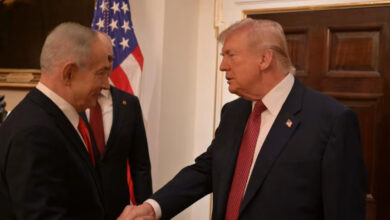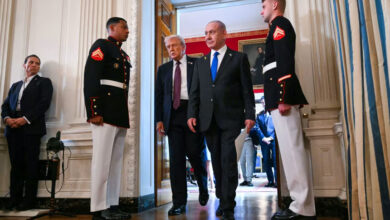Taha Hussein (1889- 1973), the most prominent intellectual in twentieth century Egypt, was regularly accused by ultra-nationalists and Islamists as being a mouthpiece for Zionism and apathetic in terms of the Palestinian issue. A new book by journalist Helmy Alnamnam, "Taha Hussein and Zionism,” attempts to refute these charges.
Hussein, who was blind as a child, had no shortage of ambition. He hoped to reform the way in which Arabic prose was generally written; relocate the role of religion in public and intellectual life; link Egyptian culture with its Western counterpart; and investigate Egypt’s intellectual legacy without worrying about religious and cultural taboos.
He was also deeply involved in politics, especially in the first half of the twentieth century, as a leading member of Egypt’s secular Liberal Constitutional Party, which was founded in 1922.
At this time, Egyptian Prime Minister Isma'il Sidqi maintained a close economic relationship with a number of Jewish companies, some of them said to be affiliated with the Zionist project in Palestine. Sidqi favored the 1947 UN Partition Proposal and, in 1948, opposed sending Egyptian troops to Palestine to fight the Zionist interlopers.
At this time, Egypt’s Jewish community was flourishing. There were numerous Jews in the government and a host of Jewish artists, journalists and business leaders. This gave rise to the perception that Taha Hussein–along with his generation–never fully understood the Palestinian cause or the Zionist movement.
Alnamnam tries to challenge this contention. According to him, Egyptian intellectuals of the 1920s and 1930s had been active in warning about the dangers of Zionism, especially its negative impact on the rights of the Palestinian people.
Alnamnan cites three pivotal incidents linking Taha Hussein to Zionism.
In 1927, Hussein was the PhD thesis supervisor for Israel Wolfenson, an Egyptian Jewish student at the Egyptian University (which would later become Cairo University). Wolfenson’s thesis tackled the alleged Jewish presence in the Arabian Peninsula and so is therefore considered controversial until today.
Some writers believe that the thesis (later published under the title "The Jews in Arabia") was an attempt by Hussein and Wolfenson to give Jews a historical, cultural and political significance in the area that never really existed.
The second contentious incident occurred in 1943, when Hussein delivered a lecture at the Egyptian Alexandria Israelites School about Jews and Arabic Literature. The lecture was widely criticized as it came at a time when the Palestinian cause was becoming of vital importance to the Egyptian public, when the local press teemed with accounts of armed confrontations between Palestinians and Jewish paramilitary groups.
Moreover, the Muslim Brotherhood, along with other political factions, was becoming increasingly critical of the considerable Jewish influence in Egypt.
The third major factor which seemed to suggest Zionist sympathies on the part of Hussein was the fact that he served as editor-in-chief for Al-Katib Al-Masry (“The Egyptian Writer”) magazine. Al-Katib Al-Masry was funded by the Hararism, a rich Jewish family of which a former minister of finance–Victor Harari Pasha (1857-1945)–was a prominent member.
But Alnamnam argues that these facts alone don’t prove that Hussein supported Zionism. Rather, the author claims, Hussein had been fully aware of the differences between Zionism and Judaism.
Furthermore, Wolfenson and his thesis can be seen as evidence of Egypt’s open-mindedness and cultural wealth at the time. Wolfenson was a good example of an integrated Jewish cultural figure that wrote for newspapers and tried to benefit from the concurrent intellectual boom at the Egyptian University.
Alnamnam goes on to suggest that, although he had been involved in discourse on Jewish topics and with Jewish people, Hussein in fact stood against Zionism.
Hussein wrote articles in 1933 and 1934 condemning the British occupation for causing the misery of the Palestinian people. In these essays, he blamed the colonial powers for the crisis in Palestine, blaming Europe for creating the “Jewish problem.”
Hussein’s fiercest criticisms of Zionism came after the Second World War, particularly following the establishment of the Jewish state in 1948. At this time, Hussein wrote articles attacking Zionism, Britain and the United Nations, in which he argued that Israel would never seek peace since it had been established on an expansionist ideology.
This assertion resonates with today’s controversies surrounding cultural normalization, and is revived whenever an Egyptian intellectual raises the notion of peace with Israel, or whenever an Egyptian literary work is translated into Hebrew.
At the periphery of the perennial intellectual battle over Zionism lies an Egyptian audience seldom encouraged to distinguish between Zionism and Judaism. The battle against Zionism, not against Judaism, is the longstanding argument of secular or semi-secular intellectuals.




